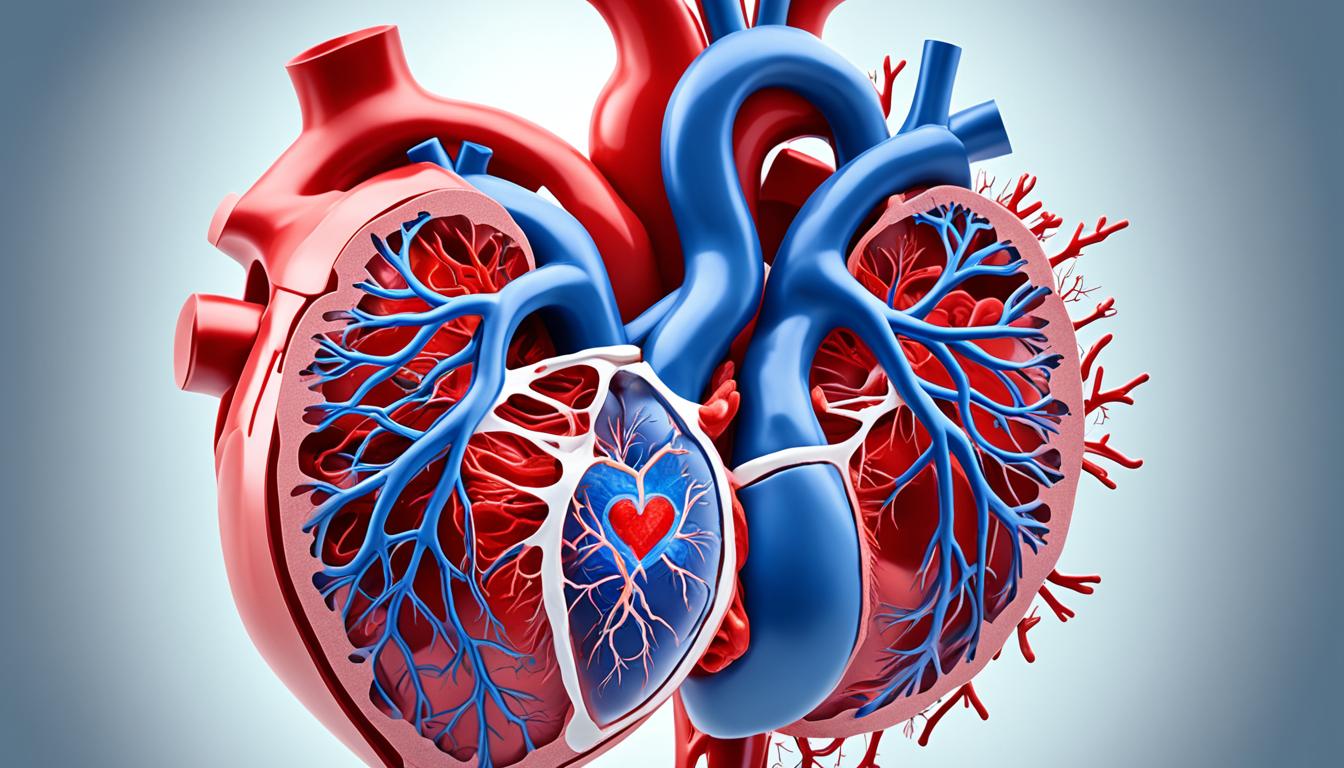Myocardial ischemia happens when there’s not enough blood flow to the heart muscle. This is often due to a blocked or narrowed coronary artery. It can cause chest pain, known as angina pectoris, or even a heart attack. Knowing about its symptoms, causes, and diagnosis is really important for helping people with this condition.
New treatments like stem cell therapy show a lot of promise for myocardial ischemia. They offer hope to patients.
Key Takeaways:
- Myocardial ischemia is characterized by reduced blood flow to the heart muscle.
- Symptoms of myocardial ischemia can include chest pain and shortness of breath.
- Common causes of myocardial ischemia include coronary artery disease and atherosclerosis.
- Diagnosis typically involves a combination of medical history, physical examination, and diagnostic tests.
- Stem cell therapy has shown promise as a potential treatment for myocardial ischemia.
Symptoms and Causes of Myocardial Ischemia
Myocardial ischemia is when the heart’s blood flow is reduced. The main sign is chest pain. This pain feels like squeezing or pressure in the chest.
The top cause is coronary artery disease. It happens when heart arteries are narrowed or blocked. This often comes from plaque buildup – things like cholesterol and fat. Certain things make you more likely to get myocardial ischemia. These include high blood pressure, smoking, being overweight, diabetes, and having heart disease in the family.
Diagnosis of Myocardial Ischemia
Diagnosing myocardial ischemia requires a deep look into a patient’s medical past and a physical exam. Along with different tests, these steps help doctors find out if someone has this heart condition. They can also figure out the best way to treat it.
The first step is talking about the patient’s symptoms. These might include chest pain. Doctors also ask about family history and other health issues like high blood pressure or if someone is overweight.
The checkup is vital to spot signs of myocardial ischemia. Doctors listen to the heart and look for any other warning signs.
Diagnostic Tests for Myocardial Ischemia
Doctors use various tests to confirm if someone has myocardial ischemia. These tests show how well the heart is working and if there are any artery blockages.
- Electrocardiogram (ECG): This test measures the heart’s electrical activity without touching the body. It can spot signs of myocardial ischemia in the heart’s rhythm.
- Stress Test: This test checks how the heart handles exercise. It’s done on a treadmill or bike. It shows if the heart gets enough blood during activity, which is vital for detecting myocardial ischemia.
- Coronary Angiogram: Sometimes, a coronary angiogram is needed. It uses a dye to show if any arteries are blocked or narrow. This test helps doctors see the heart’s blood flow clearly and look for issues related to myocardial ischemia.
All this info together helps doctors firmly diagnose myocardial ischemia. It’s critical for starting the right treatment and reducing the risks tied to this condition.
Stem Cell Therapy for Myocardial Ischemia
Stem cell therapy shows a lot of promise for treating myocardial ischemia. It uses stem cells, like mesenchymal stem cells from either bone marrow or fat. They aim to fix damaged heart tissues and boost heart function.
These special stem cells can turn into different cell types needed for heart repair. For example, they can become heart muscle cells or cells that line blood vessels. This ability is key to fixing areas of the heart hit by a heart attack.
Studies, both in labs and with people, show that stem cell therapy is safe and works well. It helps the heart work better and cuts down on scar tissue from heart attacks. The progress in these studies is encouraging, leading to more research. This research is focused on better ways to use stem cells in treatment.
Stem cell therapy is a big part of regenerative medicine, changing how we think about heart health. It keeps getting better with new findings and discoveries. Maybe one day, it will be a common and successful way to treat myocardial ischemia, giving hope to many.

